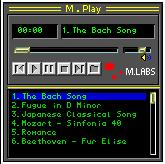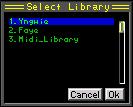M.Play
![]()
Midi Player Software for the Palm v1.0
Presented by MobileSoft Labs
![]()
Thank you for trying out our product.
In this file you shall find product information, an installation guide, and background on some of the aspects in the writing of this application.
Product Features of M.Play :
![]() Fully
Graphical User Interface
Fully
Graphical User Interface
![]() Supports
Color or Grayscale Displays
Supports
Color or Grayscale Displays
![]() 3-D
Playback Controls
3-D
Playback Controls
![]() Selectable
Playlists
Selectable
Playlists
![]() Track and
Timing Information
Track and
Timing Information
![]() Midi
Capability
Midi
Capability
We also plan to release versions in the future that supports more features, so keep the suggestions coming!
![]()
Top | Content | Install | Controls | Technical | About Us | End

